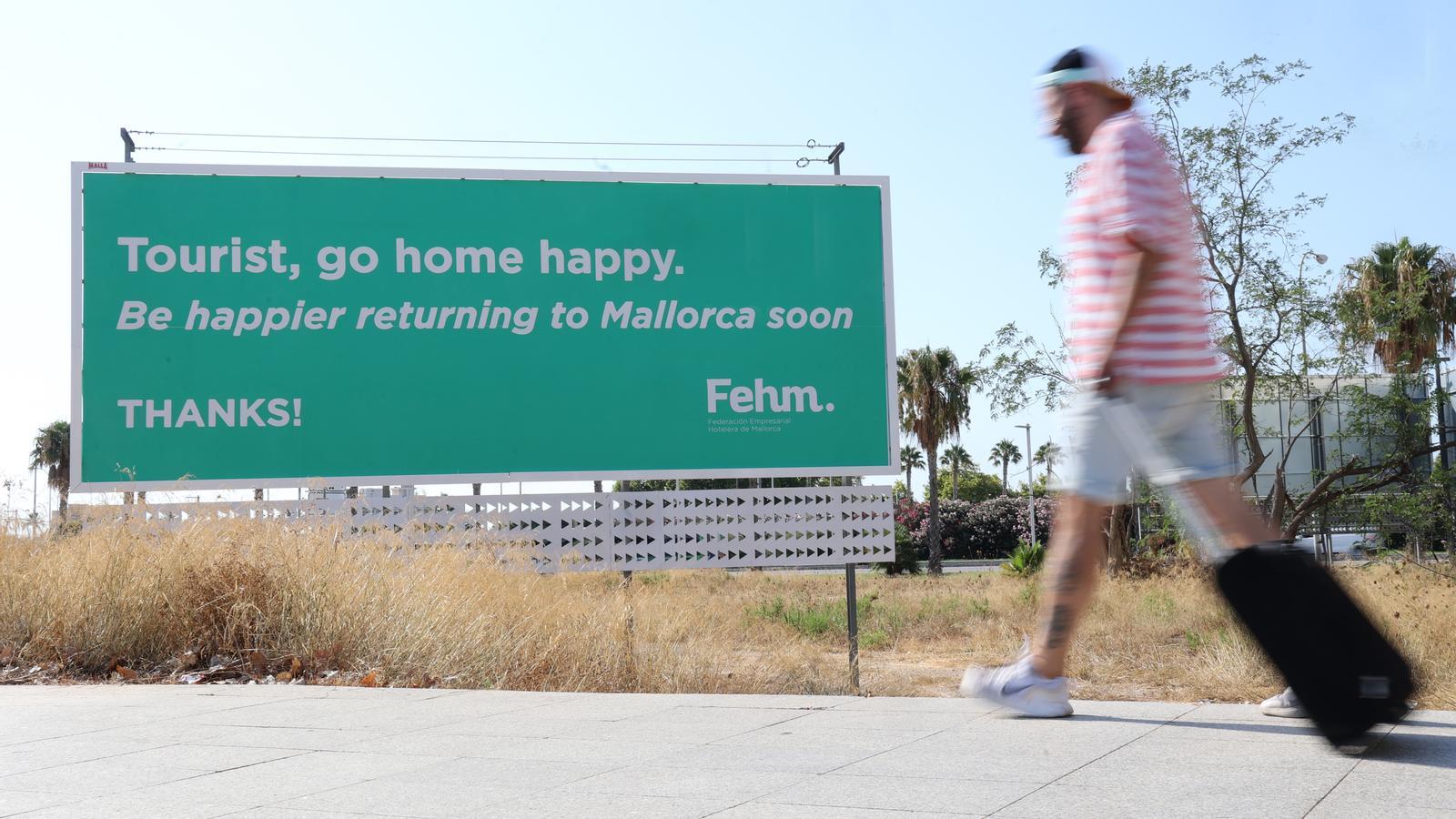The escalation of a conflict that goes beyond tourism
While hoteliers launch a campaign to counter tourism phobia, tensions over the lack of access to housing are growing, highlighting how tourist rentals have caused a collapse in the economic model.


PalmStephan Schulz left Santanyí for Germany a few days ago, as he does every summer. "I can't stand such intense heat, and to be honest, neither can the traffic jams and crowds everywhere." He runs a small IT consultancy and works remotely for much of the year from Mallorca, at a brother's house. Before leaving, he saw one of the 20 billboards where hoteliers tell visitors to go home... but satisfied: "I understand the campaign; the islands live off tourism. And I also understand that locals are feeling tired. I have friends here. It's not an easy issue, and I don't know if I would know how to resolve it." The hoteliers' statement is a play on words intended to counter the anti-tourism campaigns that, like it or not, are gaining momentum and are now reaching the source markets. "We've acted because this is no longer a joke. And some tourists are worried about not being welcomed," confirms María José Aguiló, Executive Vice President of the Hotel Federation. "We are proud of our destination and its values, and we don't think it's right to focus criticism on tourists. It's true that there are problems, as in any economic activity, but what we must do as a society is confront them. There is a cumulative deficit in public management in mobility and access to housing that goes beyond tourism."
On July 6, just a few days before leaving Mallorca, Schulz was able to read in the Picture an article asking Mallorcans not to "insult" the Germans, following a graffiti in Santanyí that said "German, raus" (German, out). Not only the Image, But other publications in the source markets have reported on the various anti-tourism actions. The escalation of the conflict began with the protests in the summer of 2024, which have been repeated this year, including the graffiti on the Ministry of Tourism. "I would have liked the organizers of the anti-tourism demonstrations to have condemned these graffiti, because in my opinion, they would have had more credibility," Tourism Minister Jaume Bauzà told ARABalears, who "understands" that there is public disenchantment over, above all, "the housing problem."
Confrontation
This isn't the first campaign launched on the islands to remind tourists they are welcome. But this one comes at a time of particular confrontation between a segment of society that lives there and those that blame it for all the ills. And hoteliers are beginning to worry about the potential impact abroad of a growing backlash against the islands' main activity. Sean Tipton, spokesperson for the Association of British Travel Agents (ABTA), confirms that "recent protests demonstrate that a balance between the well-being of residents and attractiveness to visitors isn't always achieved." Furthermore, the spokesperson states that "ABTA recognizes that the term 'mass tourism' often simplifies a complex and diverse reality, with issues such as affordable housing varying by destination."
"I think we've always demonstrated a commitment to the island economy and society," says hotelier Jaume Horrach. "We have 23 regional delegations working at a very local level, addressing a noise problem or a poorly draining gutter. And also addressing stable employment or training. I think we need to take a close look at what has triggered this feeling of burnout among citizens," he adds.
The answer to Horrach's insinuation is confirmed by the philosopher and former member of Terraferida, Joaquín Valdivielso. "There is a before and after airbienbification. The Law of Carlos Delgado (2012) with single-family homes and Biel Barceló (2017) legalizing apartments enshrine this model that skyrockets from 2016 onwards. Therefore, both the right and the left legitimize this boom, which adds to what already exists," he says, and points to a key issue: "The hotelization of housing adds a new and very serious problem: access by the local population," he asserts. The social researcher believes that this element has caused a very significant part of the opposition toward tourism.
Laura Marín works for a hotel chain in Playa de Palma, and her father once worked in a hotel. "I was able to study at university so my parents could work hard. Tourism gave us an opportunity, and all of us siblings have been able to have professional careers. Today, things have become complicated for many reasons. I find that some of the tourists who come here are a disaster; they do things they wouldn't be allowed to do in their own countries," she warns. "It makes me angry when, to analyze the problem, tourism is used in a generic way. In my company, we try to offer quality and respect the environment, and we have part of the workforce that has been the same since we've been here 12 years. All tourism is lumped together, and I think it's time to see what model we want," she confirms.
If the question is put to hoteliers, the answer is clear, and it's not the first time it's been asked: "In recent years, it's not our sector that has grown. And furthermore, if we read the explanatory statement of the Barceló Law, at a time when tourist rentals were sold to us all as a collaborative economy, it speaks of the fact that, if we consider it now, problems such as saturation in specific locations or mobility are caused by this uncontrolled activity," says María José Aguiló, for whom "it's very important that the visitor experience and the lives of locals don't involve an obstacle course."
Why has the supposed influence of hoteliers on governments not led politicians to put an end to illegal supply as they are asking? "The rentier population has multiplied. If you implement more measures, there are people who stop earning money, and now it's not just the typical actors from 30 years ago. Now there's a large middle class that's living in a situation that can be classified as parasitic. They're the new social power, and no party has incorporated the issue into their programs, because that's what they want to say. We can't analyze the conflict with pre-Airbnb codes," Valdivieso concludes.
According to philosopher Joaquín Valdivielso, criticism of tourism is nothing new. It has always been linked to the uneven distribution of wealth and a high impact on the natural environment. But the emergence, just over a decade ago, of tourist rentals—especially when it reached apartments—is considered "a new model, a new boom." "This hotelization is causing neighborhoods in Palma, many towns and cities like Ciutadella, to experience a radical change and see social costs multiply, especially access to housing," he asserts. Therefore, "the direct victims" are multiplying while a privileged group "sees their profits exponentially increase through the extraction of rent," both from visitors and locals.

